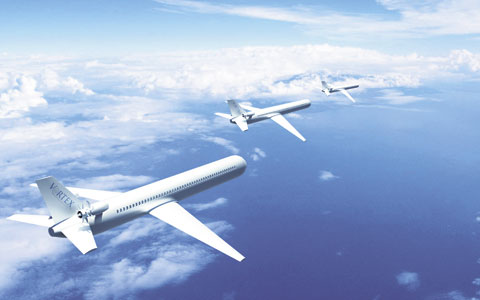Nine TU Delft students have won a Dutch aviation award for their idea of having airliners fly like geese: in formation. They calculated a 50 percent fuel reduction.
The inspiration came from geese, Hugo Dijkers and Joren de Wit, members of the winning student team, admit. These birds fly great distances, always in the typical V-shaped formation, which reduces their energy needs by as much as 60 to 70 percent. So why not learn from nature and have large airplanes fly in formation as well?
Dr Wouter Beelaerts van Blokland (Aerospace Engineering), who was the students’ principal supervisor, proposed the project to the students after having checked its feasibility. He discovered that for formation flying to work, the mutual position of the aircraft must be controllable within 10 centimeters. If so, that degree of precision navigation should indeed be achievable, he asserts.
The force behind formation flying comes from the quasi-static air currents originating at the wingtips during flight. These so-called vortices are normally feared, as they can drag other aircraft down, but a vortex also has a region that pushes other aircraft up and reduces their drag. That’s what geese benefit from.
“It’s a paradigm shift,” says Dr Beelaerts van Blokland. “When you don’t know exactly where the vortex is, you prefer to stay away from it. But once you can locate it precisely, you can benefit from it.”
The team proposes to pinpoint the vortex by using Lidar technology (a remote sensing technology that uses laser pulses to measure distances). Only one wing will be lifted by the vortex of the plane in front. This means that the other wing and the rudder must be especially equipped to deal with the permanent imbalance. The students propose to achieve this using morphing wing technology.
The organisers of the Nationale Luchtvaartprijs (National Aviation Award) called for innovative, energy-saving aviation proposals. The students reckon that the open rotor jet will save 20 percent on fuel, and formation flying, with the benefit of lighter aircraft carrying less fuel, will save another 30 percent.
In their vision, future airliners flying from, say, Paris, Amsterdam and Munich, will gather above Ireland, before crossing the Atlantic in formation, taking turns taking the lead, and then splitting up to their various destinations above the US east coast.
Dat stelde Kamerlid Diederik Samsom vandaag tijdens de Politieke Lunch van de OWEE. De drie TU’s zouden volgens hem een voorbeeld moeten nemen aan de Landbouwuniversiteit Wageningen. “Die zijn al een stap verder.” Hij deed zijn uitlating op de vraag hoe en waar de kwaliteit van het hoger onderwijs verbeterd kan worden.
Leunen
Panelgenoot Mark Harbers (VVD) verwelkomde Samsoms visie. “Ik ben blij dat de PvdA een grote rol ziet voor bedrijven. Zijn partij wil in het hele onderwijs de kwaliteit verhogen, maar volgens Harbers moeten universiteiten minder gaan leunen op prestige op grond van onderzoek en uitvindingen. “Onderwijs is net zo belangrijk.” Investeren in kwaliteit van docenten en onderwijsvoorzieningen vindt hij minstens zo belangrijk.
Druk
Jasper van Dijk van de SP sloot zich wat betreft de verhoging van de onderwijskwaliteit aan bij Harbers. “Er zijn veel studenten en de druk op docenten en faciliteiten neemt toe. De kwaliteit staat onder druk. Dus moet je investeren om te zorgen dat je geen massacolleges meer hebt, maar goede begeleiding geeft.”
Onafhankelijk
Minder happig was Van Dijk op de door Samsom bepleite groter rol van het bedrijfsleven. “Ik ben terughoudend wat betreft de rol van bedrijven. Universiteiten moeten niet gaan onderzoeken wat bedrijven willen. Of onderzoeksresultaten laten afhangen van de wens van het bedrijf. De universiteit moet wetenschappelijk onafhankelijk blijven.”
Docentencorps
D66’er Boris van der Ham denk dat dat gemakkelijk is te ondervangen. “Dat los je op door met heel veel bedrijven zaken te doen.” Verder bepleitte hij investeringen in en aandacht voor verbetering van het docentencorps, zeker omdat er door de vergrijzing binnenkort grote behoefte komt aan nieuwe docenten.
Omzetten
Zijn mening dat universiteiten veel beter hun kennis zouden moeten omzetten in producten en bedrijven, werd bestreden door Stip-raadslid Mariëlle van Kooten. Zij wees Van der Ham fijntjes op het bestaan en succes van YES!Delft. “Die starters hebben we hier dus al.” Volgens haar is het van belang dat de balans onderzoek en onderwijs goed blijft, want juist vanwege de breed-ontplooide studenten komen grote bedrijven volgens haar bij de TU shoppen.



Comments are closed.